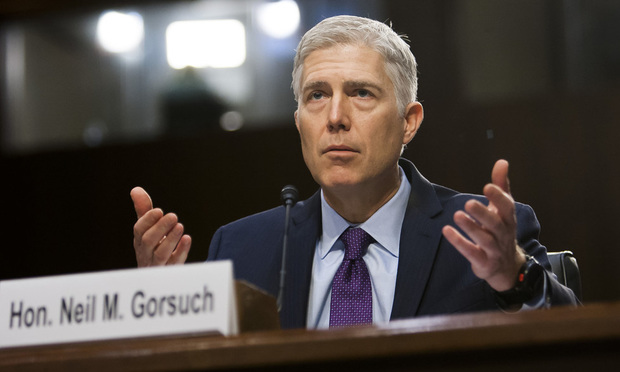In Alabama Case, Gorsuch and Sotomayor Champion a Scalia Cause
"I still have two relatively new colleagues, one very new colleague, Brett Kavanaugh and Neil Gorsuch. And we've agreed in quite a few cases, we've disagreed in a bunch," Sotomayor said in a recent interview.
November 19, 2018 at 02:47 PM
5 minute read
The original version of this story was published on National Law Journal
 Neil Gorsuch testifies at his confirmation hearing in March. Photo: Diego M. Radzinschi/NLJ
Neil Gorsuch testifies at his confirmation hearing in March. Photo: Diego M. Radzinschi/NLJ
The late Justice Antonin Scalia led a revolution in how to interpret the constitutional right to confront your accuser. Justice Neil Gorsuch on Monday seemed ready to carry the flag.
As a judge on the U.S. Court of Appeals for the Tenth Circuit, Gorsuch, who took Scalia's seat after his death in 2016, had not written on the scope of the Sixth Amendment's confrontation clause. But in a dissent Monday in an Alabama drunk-driving case, Gorsuch offered a hint of where he may be headed. Gorsuch, joined by Justice Sonia Sotomayor, had urged the court to take up the case.
“Because cross-examination may be 'the greatest legal engine ever invented for the discovery of truth,' the Constitution promises every person accused of a crime the right to confront his accusers. That promise was broken here,” wrote Gorsuch, citing a 1970 Supreme Court decision.
Scalia launched a rigorous interpretation of the confrontation right in his 2004 majority opinion in Crawford v. Washington. That decision held that out-of-court statements that are “testimonial” can't be admitted into evidence unless the accused has an opportunity to confront the declarant.
In the Alabama case—Stuart v. Alabama from the Alabama Court of Criminal Appeals—the state introduced in evidence the results of Vanessa Stuart's blood-alcohol test taken hours after her arrest. She was charged with negligent homicide and driving under the influence of alcohol. The state did not bring to the witness stand the analyst who performed the test, but a different analyst who, using the results of the test, tried to estimate what Stuart's blood alcohol level was when she was driving.
“Through these steps, the state effectively denied Ms. Stuart the chance to confront the witness who supplied a foundational piece of evidence in her conviction,” Gorsuch wrote. “The engine of cross-examination was left unengaged, and the Sixth Amendment was violated.”
Gorsuch noted that “to be fair,” the court's opinions in this area “have sown confusion in the courts across the country.” Alabama argued that it didn't offer the test for the truth of what it said, only to provide the analyst-witness a basis for estimating Stuart's blood alcohol level when she was driving. The state contended it was free to do so under a 2012 fractured Supreme Court decision. The state also claimed the confrontation right did not attach because the test report was not “testimonial.”
But Gorsuch wasn't buying the state's arguments.
First, he wrote, “Why would any prosecutor bother to offer in evidence the nontestifying analyst's report in this case except to prove the truth of its assertions about the level of alcohol in Ms. Stuart's blood at the time of the test? The whole point of the exercise was to establish—because of the report's truth—a basis for the jury to credit the testifying expert's estimation of Ms. Stuart's blood-alcohol level hours earlier.”
And as for the nontestimonial argument, he said, “But however you slice it, a routine post-arrest forensic report like the one here must qualify as testimonial. There's no question that Ms. Stuart was in custody when the government conducted its forensic test or that the report was prepared for the primary purpose of securing her conviction.”
 Justice Sonia Sotomayor. Credit: Jason Doiy/ ALM
Justice Sonia Sotomayor. Credit: Jason Doiy/ ALMGorsuch and Sotomayor would have granted review to offer lower courts “more clarity” in this area of the law.
Scalia used to say that he was one of the most pro-criminal defendant justices because of his interpretations of the confrontation clause and the jury's fact-finding role. And although Gorsuch's dissent seems to signal a similar concern with the confrontation clause, he is not generally on the side of criminal defendants and instead, often finds himself more comfortably aligned with Justices Clarence Thomas and Samuel Alito Jr.
What to make of Sotomayor's joining of Gorsuch's dissent? Sotomayor recently offered some thinking about her new colleagues.
“Conservative, liberal, those are political terms,” Sotomayor said in an interview with CNN's David Axelrod. “Do I suspect that I might be dissenting a bit more? Possibly, but I still have two relatively new colleagues, one very new colleague, Brett Kavanaugh and Neil Gorsuch. And we've agreed in quite a few cases, we've disagreed in a bunch. But you know, let's see.”
Read more:
Sotomayor, Asked About Kavanaugh: 'We Are Going to Let These Times Pass'
John Roberts Sees Himself as 'Honest Broker' Among the Justices
Unlike Gorsuch, Kavanaugh Jumps Into SCOTUS Cert Pool
Gorsuch, Thomas and Alito Stand Together, Anew, Against a Criminal Defendant
Justices Thomas and Gorsuch Call for Curbs on Federal Agency Power
This content has been archived. It is available through our partners, LexisNexis® and Bloomberg Law.
To view this content, please continue to their sites.
Not a Lexis Subscriber?
Subscribe Now
Not a Bloomberg Law Subscriber?
Subscribe Now
NOT FOR REPRINT
© 2025 ALM Global, LLC, All Rights Reserved. Request academic re-use from www.copyright.com. All other uses, submit a request to [email protected]. For more information visit Asset & Logo Licensing.
You Might Like
View All

Did Ahmaud Arbery's Killers Get Help From Glynn County DA? Jury Hears Clashing Accounts

Trump Fires EEOC Commissioners, Kneecapping Democrat-Controlled Civil Rights Agency
Trending Stories
- 1'Reverse Robin Hood': Capital One Swarmed With Class Actions Alleging Theft of Influencer Commissions in January
- 2Hawaii wildfire victims spared from testifying after last-minute deal over $4B settlement
- 3How We Won It: Latham Secures Back-to-Back ITC Patent Wins for California Companies
- 4Meta agrees to pay $25 million to settle lawsuit from Trump after Jan. 6 suspension
- 5Stevens & Lee Hires Ex-Middle District of Pennsylvania U.S. Attorney as White-Collar Co-Chair
Who Got The Work
J. Brugh Lower of Gibbons has entered an appearance for industrial equipment supplier Devco Corporation in a pending trademark infringement lawsuit. The suit, accusing the defendant of selling knock-off Graco products, was filed Dec. 18 in New Jersey District Court by Rivkin Radler on behalf of Graco Inc. and Graco Minnesota. The case, assigned to U.S. District Judge Zahid N. Quraishi, is 3:24-cv-11294, Graco Inc. et al v. Devco Corporation.
Who Got The Work
Rebecca Maller-Stein and Kent A. Yalowitz of Arnold & Porter Kaye Scholer have entered their appearances for Hanaco Venture Capital and its executives, Lior Prosor and David Frankel, in a pending securities lawsuit. The action, filed on Dec. 24 in New York Southern District Court by Zell, Aron & Co. on behalf of Goldeneye Advisors, accuses the defendants of negligently and fraudulently managing the plaintiff's $1 million investment. The case, assigned to U.S. District Judge Vernon S. Broderick, is 1:24-cv-09918, Goldeneye Advisors, LLC v. Hanaco Venture Capital, Ltd. et al.
Who Got The Work
Attorneys from A&O Shearman has stepped in as defense counsel for Toronto-Dominion Bank and other defendants in a pending securities class action. The suit, filed Dec. 11 in New York Southern District Court by Bleichmar Fonti & Auld, accuses the defendants of concealing the bank's 'pervasive' deficiencies in regards to its compliance with the Bank Secrecy Act and the quality of its anti-money laundering controls. The case, assigned to U.S. District Judge Arun Subramanian, is 1:24-cv-09445, Gonzalez v. The Toronto-Dominion Bank et al.
Who Got The Work
Crown Castle International, a Pennsylvania company providing shared communications infrastructure, has turned to Luke D. Wolf of Gordon Rees Scully Mansukhani to fend off a pending breach-of-contract lawsuit. The court action, filed Nov. 25 in Michigan Eastern District Court by Hooper Hathaway PC on behalf of The Town Residences LLC, accuses Crown Castle of failing to transfer approximately $30,000 in utility payments from T-Mobile in breach of a roof-top lease and assignment agreement. The case, assigned to U.S. District Judge Susan K. Declercq, is 2:24-cv-13131, The Town Residences LLC v. T-Mobile US, Inc. et al.
Who Got The Work
Wilfred P. Coronato and Daniel M. Schwartz of McCarter & English have stepped in as defense counsel to Electrolux Home Products Inc. in a pending product liability lawsuit. The court action, filed Nov. 26 in New York Eastern District Court by Poulos Lopiccolo PC and Nagel Rice LLP on behalf of David Stern, alleges that the defendant's refrigerators’ drawers and shelving repeatedly break and fall apart within months after purchase. The case, assigned to U.S. District Judge Joan M. Azrack, is 2:24-cv-08204, Stern v. Electrolux Home Products, Inc.
Featured Firms
Law Offices of Gary Martin Hays & Associates, P.C.
(470) 294-1674
Law Offices of Mark E. Salomone
(857) 444-6468
Smith & Hassler
(713) 739-1250







